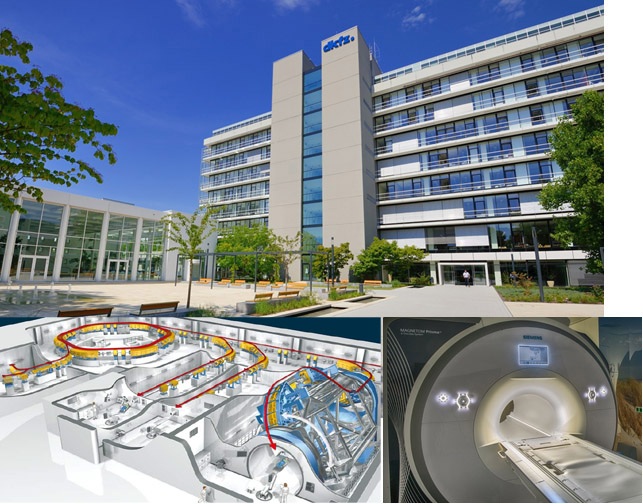Seminar: Methods of Physics in Biology and Medicine
Wintersemester 2025/26
Tuesday, 18:00 (s.t.) – 19:30 h
(This seminar is offered every summer and winter semester.)
This seminar will be offered in hybrid mode (presentations are to be given at DKFZ).
On 14.10.2025, there will be a short meeting to discuss questions (no talk).
You can participate either in person in INF 223, Room number F.01.088 or online via Zoom. The seminar will be transmitted via a room video conferencing system. See plan for location of the seminar room below.
Zoom access:
https://dkfz-de.zoom-x.de/j/88052936406
Meeting-ID: 880 5293 6406
Registration:
Closed.
Schedule
| Datum | Name | Vortragstitel |
|---|---|---|
| 04.11.2025 | Marc Bayer | Spectral precision distance microscopy (SPDM) |
| 11.11.2025 | Maxim Misirli | Interaction of ionizing radiation with matter |
| Sándor Herendy | Physics of nuclear spin systems / Nuclear magnetism | |
| 18.11.2025 | Victor Kern | Hyperpolarization of nuclear spin systems |
| Julius Kühne | Diffusion-Weighted MRI and Diffusion Tensor Imaging (DTI) (lesion detection, brain connectivity mapping) | |
| 25.11.2025 | Florian Spurk | Fluorescence imaging and immunofluorescence |
| 02.12.2025 | Jannis Strecker | Positron emission tomography (PET) |
| Sebastian Geier | Ultrasound imaging (US) | |
| 09.12.2025 | Isabella Starflinger | Functional MRI (fMRI) for measuring brain activation |
| Vencel Szabó | Physics of radiotherapy with protons, in particular eye treatments | |
| 16.12.2025 | Florian Kuck | Radiobiology (effects of ionizing radiation on biological systems / cells) |
| Jan Phillip Ott | Stimulated emission depletion microscopy (STED) | |
| Lamin Fatty | FLASH radiotherapy | |
| 13.01.2026 | Julian Mertens | Radiotherapy with heavy ions |
| Markus Renger | In vivo NMR spectroscopy (MRS) | |
| 20.01.2026 | Valentin Wegener | PET hybrid devices (PET/CT, MR/PET) |
| Soham Wadekar | Fast MRI / Echo–planar imaging (EPI) / Advanced k–space–readout techniques | |
| 27.01.2026 | Sebastian Metzler | Single–plane illumination microscopy (SPIM) / Light sheet fluorescence microscopy (LSFP) |
| Danae Droutsas | Radiation chemistry and radiation bio–chemistry | |
| 03.02.2026 | Johann Lache | Bioluminescence imaging |
| Muhammad Taha | Photoacoustic imaging |
To receive 6 credit points: talk, written report and regular attendance are required.
- duration of talk: 30 - 40 min + 5 min questions
- Talks will be given on-site at DKFZ and in parallel be transmitted via Zoom.
- written report: overview of the presented
topic, maximum 10 pages, to be handed in until
01. April 2026
(Please submit
your report and the slides of your talk via email
using the following filename
convention: <last name>, <first
name>_<matriculation number>_<abbreviated
title>_[report/slides].)
PD Dr. Tristan A. Kuder (t.kuder@dkfz.de), Prof. Joao Seco (j.seco@dkfz.de), Prof. Dr. Leif Schröder (leif.schroeder@dkfz.de)
Access to the seminar room: Due to a construction site, access to the main entrance is not obvious: Please refer to the following map: https://www.google.com/maps/d/edit?mid=16mEtQXetbcNAr7GM5Sxl5P1QreuCdRk&usp=sharing
Open in Google Maps App:
https://maps.app.goo.gl/2j1Bw8pVuHEdpUkn7
Coming from the west (point A), walk along the northern side of the building in east direction to the construction site (blue line on the map), go up the stairs to the main entrance. In the main entrance hall, go the white staircase up to the first floor. You will be directly in front of the seminar room (see red markers on the map).

